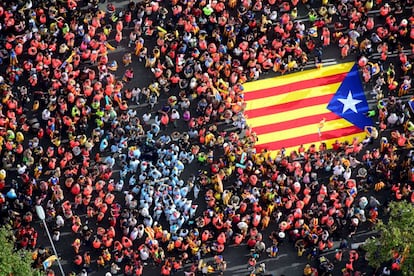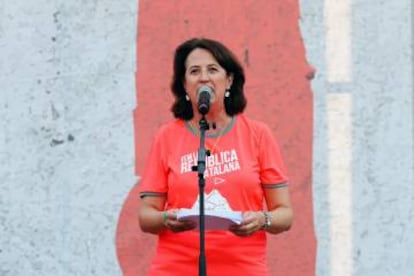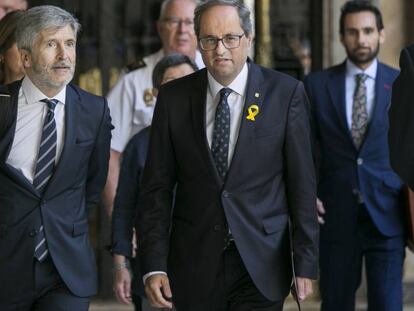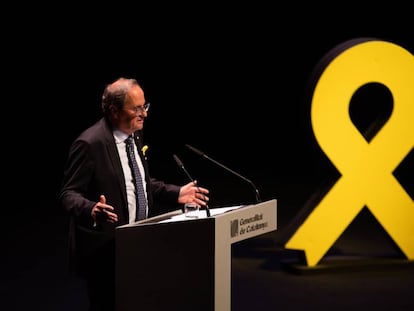Barcelona rally conceals divisions among pro-independence groups
The two parties running the Catalan government cannot agree on the best strategy toward secession from Spain

Supporters of secession from Spain put on a show of strength on Tuesday afternoon, coming out in force to march on Catalonia’s National Day, or Diada, to demand “independence” and “freedom for political prisoners.” The mass demonstration in Barcelona also provided support to a divided independence movement, whose main parties are split over the best strategy to achieve their goal.
The local police placed attendance at one million people, while organizers said that 450,000 had signed up for the march. According to this newspaper’s estimates there were around 386,000 demonstrators, based on a counting method that allows for two people per square meter, and three people per square meter at the head of the rally.
It should be noticeable that there’s been a change of government
Pere Aragonés, Catalan deputy premier
The pro-secession chants from the crowd underscored how the Diada is being increasingly co-opted by the independence movement, while leaving out Catalan groups that reject secession. The September 11 celebrations are held to commemorate the fall of the city in 1714, during the War of Spanish Succession.
All members of the Catalan government, led by the hardline separatist Quim Torra, attended the rally. Barcelona mayor Ada Colau declined to participate, saying it was too closely associated with the pro-independence movement. Unionist parties said that non-separatists could not feel a part of acts such as these.
This year’s celebrations were marked by the fact that many members of the previous Catalan government are either in custody awaiting trial on rebellion and sedition charges, or in self-imposed exile to avoid being tried in Spain. This is the case of former premier Carles Puigdemont, who fled to Belgium following the unilateral independence declaration in late October of last year, when Madrid sacked his government and imposed direct rule for over seven months.
Internal division
Despite the public show of unity on Tuesday, the two groups in the Catalan executive – Together for Catalonia (JxCat) and Catalan Republican Left (ERC) – have serious differences. While Torra is keeping up his rhetoric about unilateral independence, ERC is continuing to push for a “negotiating table.” The party’s leader, Oriol Junqueras, is one of the politicians in pre-trial custody, and ERC wants Spanish prosecutors to drop the rebellion charges against him and the others.

Prime Minister Pedro Sánchez, who has restored communication channels with Catalan nationalists, has said that the Spanish executive cannot influence the decisions of the judiciary. He has also shown support for a hypothetical referendum on greater self-government, but said that he will never greenlight a referendum on independence, which is not allowed by the Spanish Constitution.
The trial date has not been announced yet, and in the meantime hardline separatists have vowed to step up the pressure to create a clash with the Spanish state. Elisenda Paluzie, president of the civic association Catalan National Assembly (ANC) – one of the most active pro-independence groups – on Tuesday insisted on the need for outright disobedience and demanded to know how the Catalan government is going to “implant” the republic that was declared on October 27 of last year.
A former ANC leader, Jordi Sànchez, is awaiting trial over his role in the events of September 20 and September 21, when protestors outside the Catalan government’s department of economic affairs vandalized Civil Guard patrol cars and hindered the work of officers searching for material destined for the October 1 referendum, which the Constitutional Court had declared illegal.
Members of the Catalan executive stopped short of encouraging disobedience, calling instead on Madrid to take steps. “[Former PM Mariano] Rajoy caused this situation, and now it should be noticeable that there’s been a change of government,” said Pere Aragonés, the deputy premier. “We hope there will be changes in the coming weeks.”
English version by Susana Urra.









































